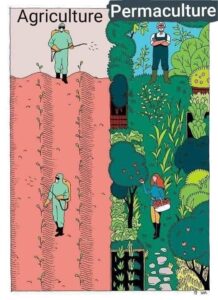
If I buy organic produce, it is all the same, right? Does it matter if I buy organic produce from supermarket or farmers’ market?
Unfortunately, all organic produce is not created equal and it does matter very much where you buy.
Most people buy organic produce for one or both of two reasons:
-
to benefit their own health and the health of their family;
-
to benefit the health of the planet (to minimize environmental impacts of “conventional” agriculture.
Many people who buy organic produce mistakenly believe that they are supporting small organic farms with rows of fragrant herbs and heirloom lettuces, stalks of corn, and mounds of zucchini plants. Organic industry packaging with pastoral scenes and soothing images of the thriving, diverse ecosystems on the boxes and labels perpetuates this vision.1
Sadly this is completely false advertising, because, ironically, small family farmers definitely cannot afford to pay for such fancy printed packaging!
Let’s take a look at what is the reality of organic farming these days and why it matters so much where you buy organic produce:
The history of Organic Food movement:
Of course, organic farming is the traditional farming and the original type of farming that has been practiced for thousands of years. The term organic was not used then because it was the only way to farm – there was no such thing as inorganic farming.
Now we use the term “organic” to refer to farming practices that do not rely on synthetic chemicals and genetically modified organisms which have only been around for less than 100 years (and have already caused a lot of harm to the planet and people’s health).
The current “organic food movement” started in the second half of the 20th century in response of the technological advances during World War II which brought “innovation” to many aspects of agriculture, resulting in large advances in mechanization (including large-scale irrigation), fertilization with synthetic chemicals, and synthetic pesticides.
In particular, two chemicals that had been produced in quantity for warfare, were repurposed for peacetime agricultural uses. Ammonium nitrate, used in munitions, became an abundantly cheap source of nitrogen. And a range of new pesticides appeared: DDT, which had been used to control disease-carrying insects around troops, became a general insecticide, launching the era of widespread pesticide use.
As more and more people are starting to realize the dangers of “synthetic agriculture” and the benefits of eating organic produce, the organic farming industry is rapidly growing and is now a multi-billion dollar market.
Of course, all the corporate giants are now jumping on the bandwagon, buying up smaller organic labels, and converting them into “organic” factory farms. They grow one variety of produce (e.g. carrot or lettuce) in a vast field (completely destroying the ecosystem of that farmland in the process) and subsequently ship the produce across the country in plastic bags.
The difference between Deep and Shallow Organic:
In her book, Harvest of Hope, Jane Goodall describes the difference between Shallow Organic practiced by most mega corporations and Deep Organic practiced by most small family farms.
Shallow Organic –
- success is measured by profits, not sustainability
- decision-makers are looking at a spreadsheet and are far away from the land
- infrastructures that values “factory” approach to reduce costs
- in service to the efficiencies of corporation
- local ecosystem is completely destroyed
- meets minimum certification standards for a check-mark
- constantly lobbying to dilute the organic label
- excessive packaging
- lots of middlemen
Deep Organic –
- small scale, focused on sustainability
- decision-makers are working on the land, making educated decisions
- focus on thriving ecosystem, in service of the land
- focus on the quality of the soil, water, and air
- resources are respected as to cause no harm to future generations
- focus on local outlets for sales
- minimal packaging
- minimal middleman
Even though buying organic produce is better for our health and for the planet compared to conventional “chemically-induced” food, not all organic is created equal, and every time you seek out and choose Deep Organic you are making a larger contribution to healing our ecosystems of wildlife, soil, water, and air.
- Goodall, J., McAvoy, G. and Hudson, G., 2005. Harvest for hope. New York: Warner Books. [↩]

